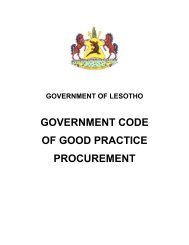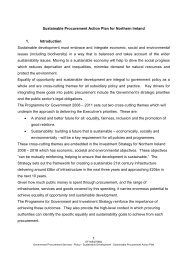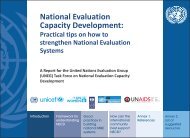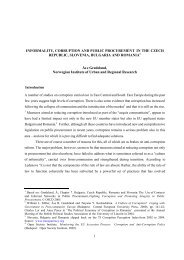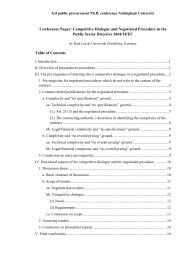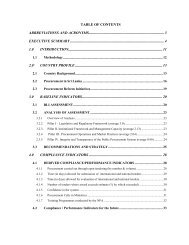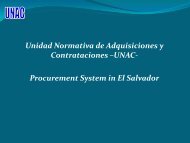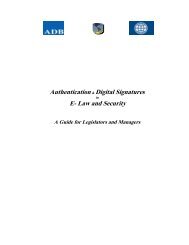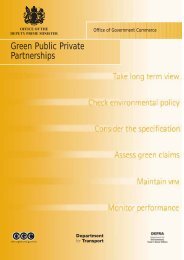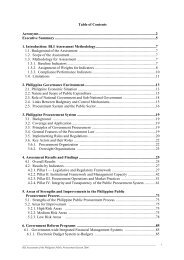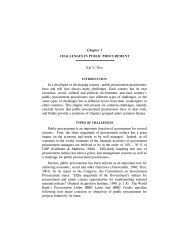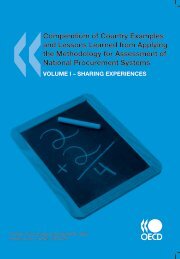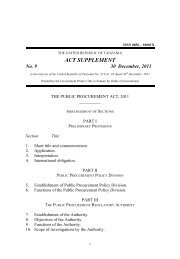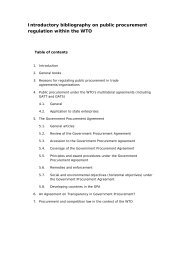The Public Procurement Rules 2008 - LGED
The Public Procurement Rules 2008 - LGED
The Public Procurement Rules 2008 - LGED
You also want an ePaper? Increase the reach of your titles
YUMPU automatically turns print PDFs into web optimized ePapers that Google loves.
CHAPTER SEVEN<br />
PROFESSIONAL MISCONDUCT<br />
127. Professional Misconduct, Offences, Etc. |— (1) Procuring Entities and Persons<br />
shall, during <strong>Procurement</strong> proceedings and execution of Contracts, ensure –<br />
(a) strict compliance with the provisions of Section 64 of the Act;<br />
(b) abiding by the code of ethics as detailed in Schedule XII of these <strong>Rules</strong>;<br />
(c) that neither it nor any other member of its staff or any other agents or<br />
intermediaries working on its behalf engages in any practice as detailed in Sub-<br />
Rule (2) below.<br />
(2) For the purpose of Sub-Rule (1) the terms -<br />
(a) corrupt practice means offering, giving or promising to give, receiving, or<br />
soliciting, either directly or indirectly, to any officer or employee of a Procuring<br />
Entity or other public or private authority or individual, a gratuity in any form;<br />
employment or any other thing or service of value as an inducement with<br />
respect to an act or decision or method followed by a Procuring Entity in<br />
connection with a <strong>Procurement</strong> proceeding or contract execution;<br />
(b) fraudulent practice means the misrepresentation or omission of facts in order<br />
to influence a decision to be taken in a <strong>Procurement</strong> proceeding or Contract<br />
execution;<br />
(c) collusive practice means a scheme or arrangement between two (2) or more<br />
Persons, with or without the knowledge of the Procuring Entity, that is designed<br />
to arbitrarily reduce the number of Tenders submitted or fix Tender prices at<br />
artificial, noncompetitive levels, thereby denying a Procuring Entity the benefits<br />
of competitive price arising from genuine and open competition; or<br />
(d) coercive practice means harming or threatening to harm, directly or indirectly,<br />
Persons or their property to influence a decision to be taken in a <strong>Procurement</strong><br />
proceeding or the execution of a Contract, and this will include creating<br />
obstructions in the normal submission process used for Tenders, Applications,<br />
Proposals or Quotations.<br />
(3) If corrupt, fraudulent, collusive or coercive practices of any kind come to the<br />
knowledge of the Procuring Entity concerned, the Entity shall call for a written explanation from the<br />
Person or firm alleged to have carried out such practices.<br />
(4) Unless a satisfactory explanation is given by the concerned Person or firm that is<br />
acceptable to the Head of the Procuring Entity, the Procuring Entity shall -<br />
(a) exclude the concerned Person from further participation in the particular<br />
<strong>Procurement</strong> proceeding; or<br />
(b) reject any recommendation for award that had been proposed for that<br />
concerned Person or;<br />
(c) declare, at its discretion, the concerned Person to be ineligible to participate in<br />
further <strong>Procurement</strong> proceedings, either indefinitely or for a specific period of<br />
time.<br />
(5) In order to implement the actions as described in Sub-Rule (4), the following<br />
procedures shall apply -<br />
(a) if the explanation from the concerned Person was found unsatisfactory, the<br />
Procuring Entity shall present a report to the Head of the Procuring Entity with<br />
all the relevant information of the case for his or her consideration;<br />
107



